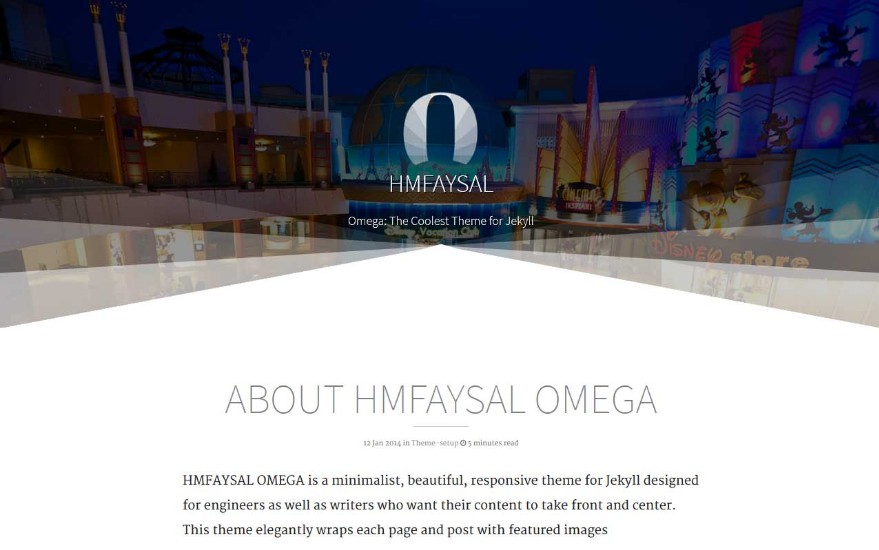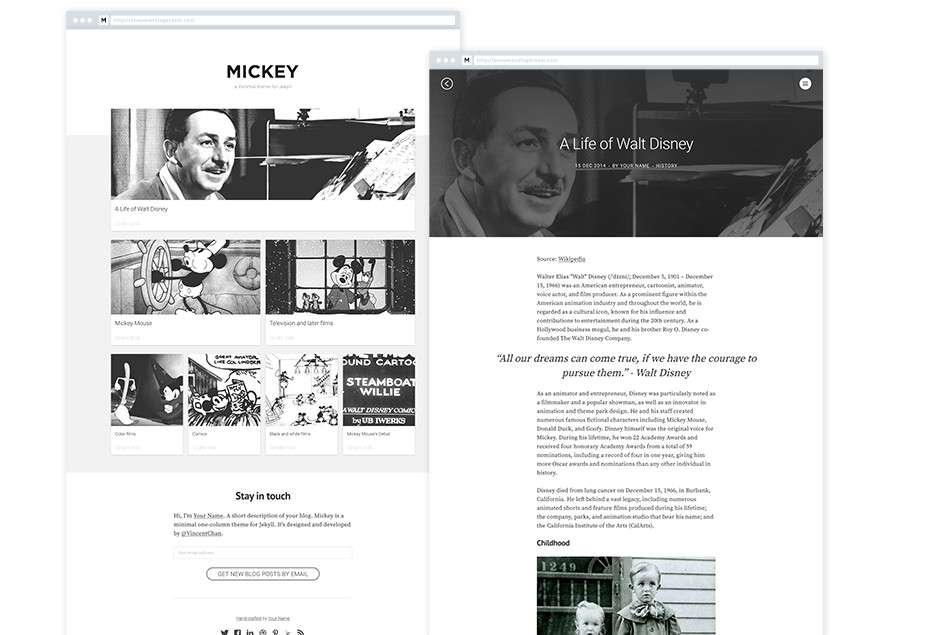HMFAYSAL OMEGA THEME
Project name: HMFAYSAL OMEGA THEME
Author: Hossain Mohd Faysal
Project type: The Coolest Theme for Jekyll License: MIT License
HMFAYSAL OMEGA is a minimalist, beautiful, responsive theme for Jekyll designed for engineers as well as writers who want their content to take front and center. This theme elegantly wraps each page and post with featured images complementing the content. It was built — by Engineer slash Mathematician Hossain Mohd Faysal.
The theme features:
- Twitter Bootstrap 3
- Option to set featured image that wraps your post in header and footer
- Custom Javascript to emphasize the first paragraph
p:first-childof your post - Variable templates for articles, quotation, video, photo and status updates (post types)
- Display Equations via Native MathJax Support
- Plugin-free/Github Pages Deployment Ready
- Read time Calculator: Calculation of post read-time based on word count (Via Liquid Tags instead of a plugin)
- Complex pagination script if you decide to turn pagination on
- CSS3 transitions for better performance
- Ability to turn of animations in _config.yml
- Readable typography to make your words shine
- Disqus comments if you choose to enable
- Simple and clear permalink structure
- Footer Menu
- SVG graphics
- Google Fonts
- 361 Fontawesome icons
- Tags for Open Graph and Twitter Cards for a better social sharing experience
- Beautifully crafted 404 page
- Custom categories and tags pages for viewers pleasure
- Stylesheets for Pygments and Coderay to make your code examples look snazzy
- Simple search that overlays results based on post title
- Sitemap for search engines
- Designed by an Electrical Engineer
Basic Setup for a new Jekyll site
- Install Jekyll and read through this installation instructions if you haven’t already.
- Fork the HMFAYSAL OMEGA Theme
- Clone the repo you just forked.
- Edit
_config.ymlto personalize your site. - Check out the sample posts in
_poststo see examples for pulling in large feature images, assigning categories and tags, and other YAML data. - Read the documentation below for further customization pointers and documentation.
Pro-tip: Delete the gh-pages branch after cloning and start fresh by branching off master. There is a bunch of garbage in gh-pages used for the theme’s demo site that I’m guessing you don’t want on your site.
Setup for an Existing Jekyll site
- Clone the following folders:
_includes,_layouts,_pages,assets, andimages. - Set the following default variables in your
_config.ymlfile:
title: Site Title
description: Site description for the metas.
logo: omikron.png
disqus_shortname: shortname
# Assign a default image for your site's header and footer
default_bg: default_bg.jpg
search: true
share: true
# Read Time is a calculator tp provide post read-time based on word count. Usage is recommended.
readtime: true
# Turn on or off the fin animations in the header and footer
triangleheader: true
animated_fins: true
# Specify the fin color in RGB value
fin_color: "255,255,255"
# Change url to your domain. Leave localhost server or blank when working locally.
url: http://localhost:4000
# baseurl:
# Gems used
gems:
- jekyll-feed
- jekyll-archives
- jekyll-paginate
- jekyll-sitemap
- jekyll-gist
- jekyll-seo-tag
# Archives configuration
# https://github.com/jekyll/jekyll-archives/blob/master/docs/configuration.md
jekyll-archives:
enabled:
- categories
- tags
layout: 'archive'
permalinks:
# year: '/:year/'
# month: '/:year/:month/'
# day: '/:year/:month/:day/'
tag: '/archive/tag/:name/'
category: '/archive/category/:name/'
# Owner/author information
author:
name: Your Name
picture: your-photo.jpg
email: [email protected]
# Use the coder's toolbox at http://coderstoolbox.net/string/#!encoding=xml&action=encode&charset=us_ascii to encode your description into XML string
description: Some Details about yourself
# Social networking links used in footer. Update and remove as you like.
twitter:
facebook:
github:
linkedin:
instagram:
tumblr:
# For Google Authorship https://plus.google.com/authorship
google_plus: "http://plus.google.com/123123123123132123"
# Analytics and webmaster tools stuff goes here
google_analytics:
google_verify:
# Links to include in top navigation
# For external links add external: true
links:
- title: Home
url: /
external: false
icon: home
- title: Categories
url: /categories
- title: Tags
url: /tags
# Sitemap configuration
# https://github.com/kinnetica/jekyll-plugins
sitemap:
file: "/sitemap.xml"
exclude:
- "/atom.xml"
- "/feed.xml"
- "/feed/index.xml"
include_posts:
- "/index.html"
# http://en.wikipedia.org/wiki/List_of_tz_database_time_zones
timezone: America/New_York
future: true
markdown: kramdown
highlighter: rouge
paginate: 6
paginate_path: "/blog/:num/"
# https://github.com/mojombo/jekyll/wiki/Permalinks
collections:
posts:
output: true
permalink: /blog/:title
pages:
output: true
permalink: /:title
kramdown:
auto_ids: true
footnote_nr: 1
entity_output: as_char
toc_levels: 1..6
Post Front Matter YAML
HMFAYSAL OMEGA uses variable post templates for articles, quotation, video, photo and status updates.
A new blog post should have the following structure to utilise the themes functions
---
layout: post
title: "Some Title" # Title of the post
description: Some description # Description of the post, used for Facebook Opengraph & Twitter
headline: Some headline # Will appear in bold letters on top of the post
modified: YYYY-MM-DD # Date
category: personal
tags: []
image:
feature: some-image.jpg
comments: true
mathjax:
---
A new status should have the following structure to utilise the themes functions
---
layout: post
type: status # ! Important
title: "Some Title" # Title of the post
description: Some description # Description of the post, used for Facebook Opengraph & Twitter
headline: Some headline # Will appear in bold letters on top of the post
modified: YYYY-MM-DD # Date
category: personal
tags: []
image:
feature: some-image.jpg
comments: true
mathjax:
---
A new quotation post should have the following structure to utilise the themes functions
---
layout: post
type: quote # ! Important
title: "Some Title" # Title of the post
description: Some description # Description of the post, used for Facebook Opengraph & Twitter
headline: Some headline # Will appear in bold letters on top of the post
modified: YYYY-MM-DD # Date
category: personal
tags: []
image:
feature: some-image.jpg
comments: true
mathjax:
---
A new video post should have the following structure to utilise the themes functions
---
layout: post
type: video # ! Important
title: "Some Title" # Title of the post
description: Some description # Description of the post, used for Facebook Opengraph & Twitter
headline: Some headline # Will appear in bold letters on top of the post
modified: YYYY-MM-DD # Date
category: personal
tags: []
image:
feature: some-image.jpg
comments: true
mathjax:
---
A new photo post should have the following structure to utilise the themes functions. By default, the featured image is shown on the blog index, but if you want to display another photo, you can choose to do so 🙂
---
layout: post
type: photo # ! Important
photo: some-image.jpg # In case you do not want the featured image to display on the front page
title: "Some Title" # Title of the post
description: Some description # Description of the post, used for Facebook Opengraph & Twitter
headline: Some headline # Will appear in bold letters on top of the post
modified: YYYY-MM-DD # Date
category: personal
tags: []
image:
feature: some-image2.jpg
comments: true
mathjax:
---
Looking for Support or Custom Solutions?
We specialize in creating stunning, fully-customized Jekyll websites tailored to your needs.
If you need assistance with setup, customization, or support, don't hesitate to contact us.
CONTACT US
